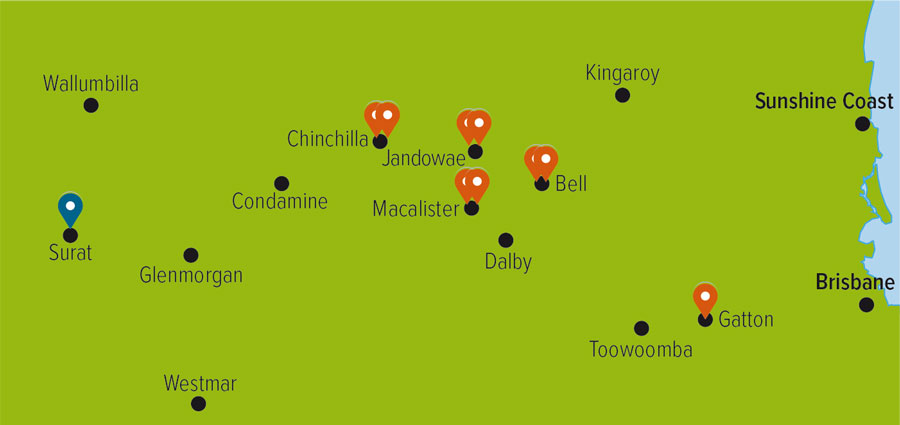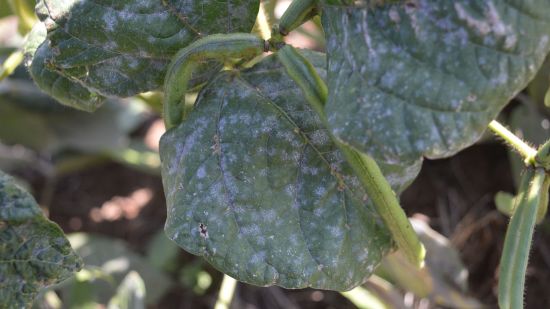Courtesy: GRDC Ground Cover, original article published online – Fungicide resistance in Queensland: be alert | Groundcover (grdc.com.au)
When the first map of fungicide resistance cases in Australia was compiled in 2016 by the research team at Curtin University’s Centre for Crop and Disease Management (CCDM), led by Associate Professor Fran Lopez-Ruiz, Queensland remained a blank region on that map.
However, ever-vigilant cereal pathologist Dr Steven Simpfendorfer from the NSW Department of Primary Industries noticed high levels of powdery mildew on wheat crops in 2022, sprayed against the disease as per industry standards, and sent samples from across Queensland for fungicide resistance testing to the national monitoring program supported by GRDC at the CCDM.
Unfortunately, resistance to Group 3 demethylase inhibitor (DMI) fungicides in these wheat samples was detected. Resistance to Group 3 fungicides had previously been documented in barley powdery mildew collected from Queensland fields, although in this case no fungicide control issues were found given the low abundance of the resistant fungal population then.
In addition, complete resistance to Group 11 quinone outside inhibitor (QoI) fungicides was also detected in the state’s wheat powdery mildew populations. These were the first documented reports of fungicide resistance in Queensland’s grain crops. The distribution of fungicide resistant samples is shown in Figure 1.
Figure 1: Map showing the nearest towns to where 10 diseased wheat samples were collected in Queensland. The orange markers to the east were samples that tested positive for fungicide resistance to Group 11- QoI fungicides. The blue marker is the only sample that tested negative for fungicide resistance against QoI fungicides. All samples tested positive to the mutations associated with resistance to Group 3 – DMI fungicides.

Source: CCDM
Professor Levente Kiss from the University of Southern Queensland says disease pressure in crops can vary from season to season and it is necessary for the whole industry to be alert.
“Powdery mildew spreads by wind, and mild weather and damp canopies sometimes favour the development,” Professor Kiss says.
In Queensland we also have a higher mix of summer and winter crops, with the potential for some pathogens, particularly in pulses, to infect diverse crops, so we need to be vigilant year-round.
CCDM’s analyses have shown that the cereal mildews in Queensland have developed resistance to both key fungicides with different modes of action used to control them, namely QoI (Group 11, strobilurin) and DMI (Group 3, triazole) fungicides.
“The development of resistance not only threatens effective crop protection, but also reduces the number of modes of action available to growers, contributing to the increase of fungicide resistance risk within those systems.
“Additionally, resistance to both QoI and DMI groups has been found together at high frequencies in fungal isolates obtained from wheat powdery mildew samples collected at some of the locations investigated.”
Regrettably, this means that the spread of fungicide resistance is expanding throughout Queensland.
Due to the widespread discovery of fungicide resistance to both DMI and QoI fungicides in 2022 in Queensland – and also in NSW, Victoria, South Australia and Victoria– the GRDC made a submission to the Australian Pesticides and Veterinary Medicines Authority (APVMA) for three emergency Use Permits with Grain Producers Australia being the holder of the permits.on the options for managing this disease.
These discussions have led to the issue of some emergency permits for the use of active ingredients quinoxyfen and proquinazid (Group 13), and metrafenone (Group 50) for wheat powdery mildew. These two different modes of action have specific activity on mildews.
Professor Kiss, who is also part of AFREN, says these findings emphasise the need for growers to implement integrated management practices when it comes to managing fungal diseases and adhering to the AFREN Fungicide Resistance Five key actions.
“Keeping up with seasonal disease issues is also important, so seek advice from local pathology experts, who you can follow on social media, and further information can be sourced through AFREN.”
More information: Professor Levente Kiss, Levente.Kiss@unisq.edu.au
To keep up-to-date with the latest on fungicide resistance, register online at afren.com.au , follow #AFREN and @theGRDC on X/Twitter, or email afren@curtin.edu.au

